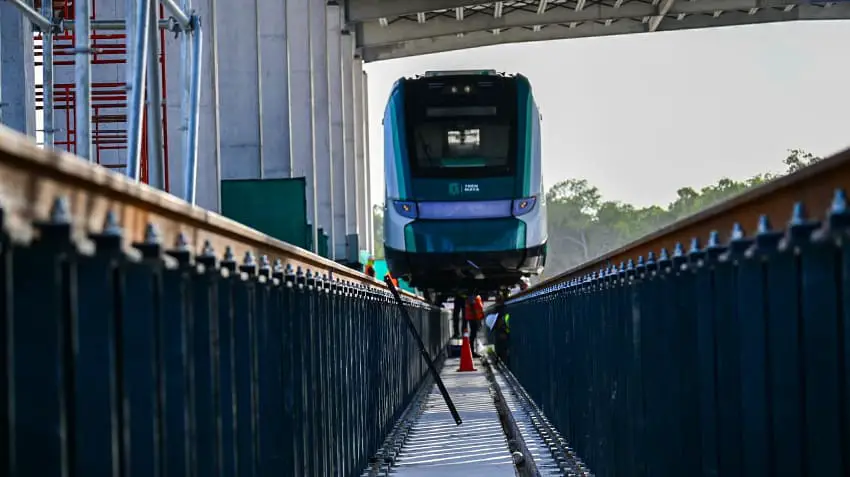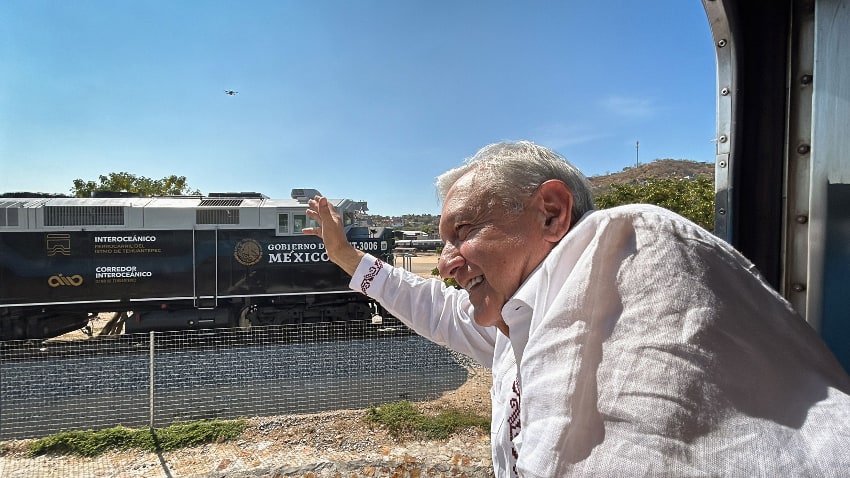President López Obrador’s plan to revive passenger train services on Mexico’s vast railroad network continues to advance.
The Ministry of Infrastructure, Communications and Transport (SICT) said Tuesday that it had received five proposals from companies interested in operating passenger train services on existing freight tracks.
![]()
The announcement came after López Obrador published a decree last November that established the provision of passenger train services as a priority for national development, and called for existing freight railroad concessionaires to present proposals for such services by Jan. 15.
The SICT said in a statement that it is reviewing the five proposals “prior to the carrying out of the respective studies.”
The ministry didn’t identify the companies that presented proposals, but Canadian Pacific Kansas City (CPKC) – which last year committed to study the feasibility of a Mexico City-Querétaro passenger train – confirmed to media outlets including Milenio and Reuters that it had presented a proposal for passenger services on an unspecified number of routes.
Reuters reported that the transport division of the Grupo México conglomerate, a major railroad operator in Mexico, declined to comment when asked whether it had submitted a proposal.
The Federal Economic Competition Commission (Cofece), Mexico’s antitrust agency, said in 2021 that Grupo México, the parent company of Ferromex and Ferrosur, managed 56% of the country’s railroads, while CPKC managed 24%. The state-owned company Ferrocarril del Istmo managed 12%, leaving just 8% of tracks to other concessionaires.
López Obrador’s Nov. 20 decree said that the government would initially issue concessions for seven passenger train routes:
- Mexico City-Veracruz city-Coatzacoalcos
- Felipe Ángeles International Airport (AIFA)-Pachuca–Tula
- Mexico City-Querétaro city–León-Aguascalientes
- Manzanillo-Colima-Guadalajara-Irapuato
- Mexico City-San Luis Potosí-Monterrey-Nuevo Laredo
- Mexico City-Querétaro city-Guadalajara-Tepic-Mazatlán-Nogales
- Aguascalientes-Chihuahua city-Ciudad Juárez
Citing unnamed sources, the El Economista newspaper reported that existing rail concessionaires hadn’t expressed interested in operating passenger services on the proposed line from AIFA or the one from Mexico City to Veracruz.

According to López Obrador’s decree, if the concessionaires “don’t present viable proposals in terms of investment, construction time [and] track modernization” or don’t show any interest at all, the federal government, via the SICT, “could grant titles of assignment to the Ministry of National Defense or the Ministry of the Navy given that they already operate the Maya Train and the Isthmus of Tehuantepec train.”
The decree also acknowledges that non-concessionaire private companies “that present proposals and are interested in providing passenger train services” could be considered.
On Tuesday, López Obrador said he expected to make progress on his rail plan before he leaves office on Oct. 1.
“There are some [companies] that are going to participate. We’re working on it, but before we go we’re going to leave the project [ready to start],” he said.

“Just imagine what [passenger train travel] means for the future,” López Obrador said before asserting that public and private investment in rail projects will create jobs and “reactivate the economy of the entire country.”
“It’s about having safe, cheap, non-contaminating transport in all of Mexico, at a national level. The only thing is we can’t start the project, but we can leave the general guidelines and blueprint,” he said.
López Obrador asserted that a project to revive nationwide train travel won’t be an expensive exercise.
“What will it cost? Nothing,” he said, adding that the project would involve nothing more than “fixing the tracks up a bit” and “buying passenger trains – what we did in the Isthmus [of Tehuantepec].”
In December, López Obrador inaugurated the Interoceanic Railroad between Salina Cruz, Oaxaca, and Coatzacoalcos, Veracrauz, as well as four of seven sections of the Maya Train railroad, which connects cities and towns in five southeastern states.
The president is frequently critical of the privatization of Mexico’s railroads during the 1994-2000 presidency of Ernesto Zedillo, and the subsequent suspension of passenger train services across the country.
With reports from Milenio, El Economista and Reuters
